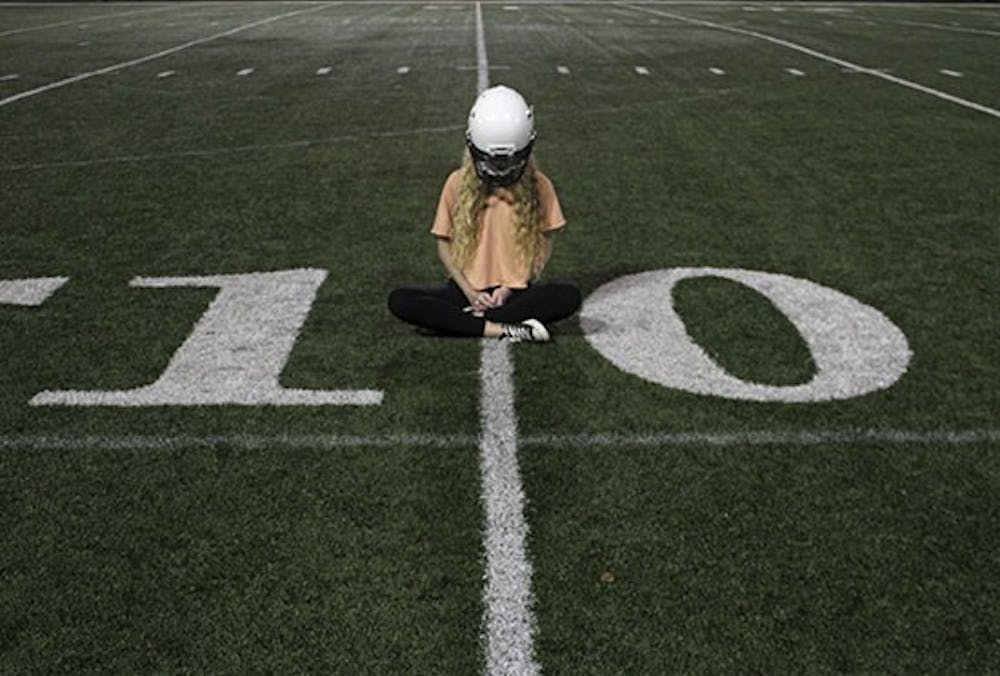“And then to find out 16 years later that all of these people just conspired against me was really heartbreaking. I mean, it’s a huge betrayal.”
Jessica Luther, a journalist who broke the news of sexual assault within the Baylor football team and wrote “Unsportsmanlike Conduct: College Football and the Politics of Rape,” said the system is designed to protect athletes. Universities don’t want players taken off the team — especially if the athlete is talented.
“That’s the key,” she said. “The main thing is this all sort of gets traced back to how much money these guys are worth to the sport.”
Sarah Desmarais, a professor at N.C. State, co-authored a study that found 54.3 percent of intercollegiate and recreational athletes admitted to sexual coercion, compared with 37.9 percent of non-athletes.
Though the sample size was small — 191 non-athletes, 159 recreational athletes and 29 intercollegiate athletes — Desmarais said the researchers found a statistically significant difference between athletes and non-athletes.
***
Luther doesn’t watch football games anymore.
She remembers seeing two football games on TV in a restaurant about a week ago.
“Of the four teams playing, I knew not good things about three of them,” Luther said. “And I just find that really exhausting now. And I just don’t enjoy it. And so I just try to avoid it at this point.”
Once a die-hard Florida State fan, Luther’s mindset changed after Jameis Winston was accused of raping a student in December 2012.
Florida State reached a $950,000 settlement with the student. Winston was never charged.
Luther was angry that media covering the Winston case focused on his athletic achievements and how the charges would affect the football team.
To get the day's news and headlines in your inbox each morning, sign up for our email newsletters.
“It felt wrong how we talked about it as if it was a sports story,” she said. “And how because we talked about it as a sports story, these other important parts of what was happening got erased.”
In the sexual assault case involving Stanford swimmer Brock Turner, the survivor expressed her outrage that articles about the case included Turner’s swim times.
“That’s a narrative that we see commonly,” said Colleen Daly, a UNC graduate and spokesperson for End Rape on Campus. “He’s not by any means an anomaly.”
Luther started writing about Winston’s case, then other cases, to counter this coverage. Right away, she was hit with backlash for speaking out.
Football fans have told her that she’s biased, she doesn’t know what she’s talking about, she’s out to destroy the team. At this point, Luther has lost track of the criticism.
“The student body has such an affinity for their athletes, for their teams, that they’re more willing to stand with the perpetrator than the survivor,” Daly said. “And that’s also unacceptable.”
***
The problem starts before college.
Desmarais said club athletes and intercollegiate athletes share one common experience — high school.
“I absolutely think that college students — whether they’re athletes or not — do not show up on a university or on a college campus as a blank slate with no preconceived attitudes and no preconceived behaviors,” she said.
Luther said she was concerned by locker room culture when researching four decades of cases. Of the 120 cases involving student-athletes, 40 percent of those cases were gang rapes.
“It does seem to suggest that there is some kind of collective experience of violence,” Luther said.
Daly said these attitudes and behaviors make education about consent even more important during adolescence — when athletes first separate from their fellow students.
“Yes, there needs to be money and strategies devoted to this problem on university campuses,” she said.
“But it also needs to start much, much earlier, in middle and possibly even elementary school.”
***
For Tracy, telling her story hurts every time.
“The thing about sexual trauma is that people think like, ‘Oh, in time, it gets better,’” she said. “But it doesn’t. It doesn’t get better ... So every time I tell my story, I feel like I go back there. It’s like opening an old wound every single time.”
Still, football coaches have invited Tracy to share her experience with their teams — including Oregon State, Nebraska, Oklahoma, SMU and Baylor.
And when Tracy shares her story, she doesn’t sugarcoat anything.
“If you’re listening to me, and you’re uncomfortable with the subject, and it outrages you, then that’s gonna be what’s gonna motivate you to get involved and to help change something,” she said.
Tracy could not prosecute her case because the statute of limitations in Oregon was six years. And even if she decided to prosecute, the evidence in her case was destroyed after three years because the police ran out of room in the evidence cabinet.
Tracy helped change the statute of limitations law in Oregon, and she worked to pass a law banning rape kits from being destroyed.
“I’ll never see real justice,” Tracy said. “But what I’m doing now is my form of justice.”
sports@dailytarheel.com




